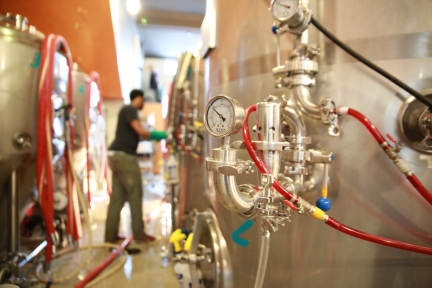
Air emissions
Most producers will not need an air permit, but you should evaluate your facility to make sure. Fuel-burning equipment, grain handling and drying equipment, back-up generators, and the fermentation process itself can all contribute to the need for an air emissions permit.
Air conditioning or refrigeration equipment
If you have air conditioning or refrigeration equipment that uses CFCs, HCFCs, or HFCs, the EPA requires that you use certified technicians who capture all refrigerants during repairs and follow EPA rules for maintenance and repair. There are additional steps to take if your equipment is large and leaky.
Hazardous waste
You need a hazardous waste identification number if your business produces any amount of hazardous waste.
Businesses generating most types of hazardous waste are required to report annually, pay a fee, and obtain a license for the subsequent year. Facilities in Anoka, Carver, Dakota, Hennepin, Ramsey, Scott, or Washington County are licensed and inspected by their county. Facilities in greater Minnesota are licensed and inspected by the MPCA. If you produce only small amounts of hazardous waste, you probably qualify as a very small quality generator:
See the hazardous waste identification and management page for information on managing specific hazardous wastes, such as corrosive (acidic or caustic) cleaners that haven't been neutralized during use.
Stormwater
MPCA industrial stormwater permit or no exposure certification is required for facilities described by SIC codes 2082 (malt beverages), 2084 (wines and brandies), or 2085 (distilled and blended liquors), unless the majority of revenue comes from on-site sales in a restaurant, brewpub, or tap room. Don’t know your SIC code? Use OSHA’s SIC code search. Businesses that don't have materials or processes exposed to rain or snowmelt qualify for the no cost, low-requirement no-exposure certification.
Wastewater
Breweries, brewpubs, and distilleries in the Twin Cities metro area must have a microbrewery wastewater permit from Metropolitan Council Environmental Services. In greater Minnesota, check with your local wastewater treatment plant to find out what their discharge requirements are. Septic systems used for non-residential purposes often require a permit from the MPCA, your county, or EPA, depending on the daily flow design. A permit is required if you will discharge wastewater to surface water.
Small amounts of fermentation wastewater and other residuals can be spread on farmland as a replacement for commercial fertilizers; larger amounts require a permit. Learn more:
Recycling
If you have a restaurant, tap room, or tasting room, are located in the Twin Cities metro area, and contract for trash collection of four cubic yards or more per week you are required to recycle at least three materials.
Local regulation
Be sure to check with your county, city, and township to see if they have any additional requirements.
Beyond compliance
- Minnesota Craft Brewers Guild connects healthy beer culture and community bringing together independent brewers, industry stakeholders, and craft beer fans. National Brewers Association manages a "resource hub" for with best practices, sustainability, and safety guides.
- The Minnesota Technical Assistance Program, located at the University of Minnesota, encourages more environmentally sustainable practices at microbreweries and micro distilleries. Find resources and past intern projects carried out at breweries on MnTAP’s brewing and distilling page.
- Reduce water use. Start with benchmarking. How many gallons of water are you using to make a gallon of product? For breweries producing less than 10,000 barrels annually, the average is around 8 gallons used per gallon produced. Minimizing water use can be especially important in rural locations, where small wastewater treatment plants may not be able to accommodate your wastewater volume.
- Reduce energy use. ENERGY STAR® Guide for Breweries provides ideas for improving energy efficiency and expected payback periods.
- Source used equipment when possible. Buy Minnesota-made when you need new. Most companies that manufacture food-grade or medical-grade tanks can fabricate tanks to your specs.